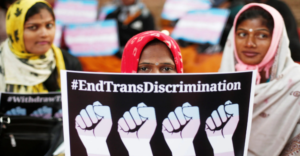Have you ever thought about why winters are becoming colder and summers are becoming more and more hotter? Don’t you think the monsoon is behaving more wildly than it used to before? Why is the sea level rising? And why is there a change in the Earth’s climate in every region? The answer to this is climate change which is caused by our irresponsible behaviors and actions.
According to IPCC (Intergovernmental Panel on Climate Change), Scientists are observing changes across the world climate system. Many of the changes are unprecedented in thousands of years and changes like rising sea levels are irreversible over hundreds of years. Many animals and birds are either moving to higher latitudes or dying. We, people, do not see the distressing realities which require our immediate attention.
India reported a heat wave in 16 states this year because of climate change. Crop productivity growth in Africa is badly affected because of climate change. Who is responsible for these extreme climate changes? Us humans.
Climate change affects everything from geopolitics to the economies of the countries. It shapes cities, and life expectancies and the list continues. Climate change refers to long-term shifts in temperatures and weather. These shifts can be natural, but for a long time, human activities have been the main reason for climate change, mainly due to the burning of fossil fuels (like coal, oil, and gas), which produce heat-trapping gases.
Climate change is not a future problem it is a present problem requiring our immediate attention. Changes to Earth’s climate driven by increased human emissions of heat-trapping greenhouse gases are already having severe effects on the environment: glaciers and ice sheets are shrinking, river and lake ice is breaking up earlier, plants and animals are getting disturbed and many species going extinct.
Effects that scientists had long predicted would result from global climate change are now occurring, such as sea ice loss, increasing sea levels, and more intense, deadly, and harmful heat waves.
WHAT HAVE WE DONE?
We, humans, do not notice daily but our actions impact the environment directly. When you can walk but still use a motorbike, you impact the environment. At times when you choose fast fashion over thrifted clothes, you impact the environment. When you buy a single-use item, you cause harm to the environment. This list is never-ending. One careless action done by billions of people every day leaves a huge carbon footprint on the environment.
Climate change is the result of all the actions done over the years. We couldn’t see the changes every day but they were always happening. The UN Climate Change conference stated that it’s a “make or break year” in the fight against climate change. The IPCC report states that even the global warming level of 1.5 degrees celsius may be breached by 2040. People will be driven into extreme poverty by the effect of climate change on food and crop production.
The heat waves would lead to a decrease in labor productivity and eventually an increase in heat-related mortality rate. The UN Secretary-General Antonio Guterres warned the world, “Our addiction to fossil fuel is pushing humanity to the brink. Enough of killing ourselves with carbon. We are digging our graves.” Reports suggest that there would be a dramatic increase in floods by 2030.
WHAT CAN WE DO INSTEAD TO HELP CLIMATE CHANGE?
The primary cause of recent global climate change is humans, so the solutions are also within the human domain. From the way we travel to how we use electricity, everything can make a difference. Here are some ways we can help our environment:
1). SAVE ENERGY: A major part of our electricity and heat are powered by coal and natural gas. Avoid unnecessary use of electricity. Switch off the lights, and fans. Minimize the use of air conditioners. Use energy-efficient appliances and bulbs. Consider changing your home’s source of energy to renewable such as wind or solar.
2). SWITCH YOUR MODE OF TRANSPORT: For a shorter distance, walk or ride a cycle instead of driving. Take a bus or train for a longer distance. If each of us even minimizes the use of cars and individual transportation by 50%, a huge difference will be seen. Consider switching to an electric vehicle.
3). REDUCE WATER WASTE: Even saving water can reduce carbon emissions. EPA estimates if one out of every 100 American homes were fitted with water-efficient fixtures, we can save enough electricity to avoid at least 80,000 tons of global warming pollution. Take shorter showers, and fix those leaks. Avoid wasting water.
4). REDUCE, REUSE, RECYCLE: A life-saving mantra. Our no.1 priority should be to reduce waste, reuse goods, and then reap the benefits of recyclable goods. Females can avoid the use of single-use sanitary napkins and switch to reusable menstrual cups. The effort can be as small as avoiding the use of plastic-packaged water bottles and instead carrying our bottles everywhere.
Once we understand the severity of climate change, we will know the urgency of the change required. But, remember, the clock is ticking and you won’t be able to snooze this alarm. It’s high time that we help our planet before it’s too late.
-By NANCY SHARMA
Must Read-https://skchildrenfoundation.org/cheetah-makes-a-comeback-in-india/




